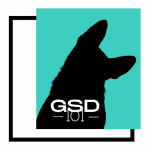If you’ve ever had any concerns about the weight of your German Shepherds, you are not alone. While obesity is a common problem for all dogs, being underweight has become an issue for some GSD owners.
Providing a balanced diet with a good amount of protein and fat can help German Shepherds to gain weight. Additionally, introducing an extra meal in a day or adding supplements like vitamin B can also work. The bottom line is to make sure your GSD has enough daily exercise and routine veterinary check-ups.
In this article, we will touch on the reasons why GSDs are underweight and how much should they weigh by age. Then we will give you a list of suggestions to help your German Shepherd to gain weight naturally. Read on to learn more.
Reasons for GSDs for being underweight
The most common reasons for your GSD to become underweight range from poor diet to health issues such as:
- Parasitic infestations
- Metabolic disorders
- Dental problem
- Stress
- Aging
These complications may affect the appetite of your dog and eventually make your dog lose weight.
In extreme cases, serious diseases like cancer, diabetes, kidney failure, and gastrointestinal disorders can also be the cause.
How bad can underweight be?
Underweight is a problem that affects the quality of your dog’s life.
An underweight dog can be a sign of some serious health problems. Being underweight means a dog’s body isn’t getting sufficient calories to fuel them up throughout the day.
This will result in weakened immunity, reduced mobility, loss of muscular function, retarded growth, or thyroid problems.
Nutritional deficiencies in an underweight dog can also find their way to some major issues like weakened bones, heart and kidney problems, hormonal imbalance, skin problems, and delayed wound healing.
Ultimately, an underweight dog has a reduced lifespan than a normal dog.
You may also read:
How to know if your German Shepherd is underweight?
The simple way to determine whether your GSD is underweight is to look after his bones like ribs, pelvis, and vertebrae. If these become very prominent and seen grossly, then obviously your dog is skinny and underweight. This shows that your dog lacks fat and muscles in these areas.
Related post: German Shepherd Weight Chart: Is My Dog Overweight or Underweight?
Identifying the causes of being underweight of your GSD is more important before helping him with weight gaining. It’s very much essential to help your dog improve his condition. As we discussed earlier, being underweight has some serious complications that affect the quality of your GSD’s life. Therefore, gaining more weight surely helps him to lead a normal life.
How much should your German Shepherd weigh?
The weight of the full-sized German Shepherd varies on their sex. An adult German Shepherd male typically weighs between 75 to 90 lbs, while female weight ranges from 60 to 70 lbs.
In the below tables, you can find the weight chart for both male and female GSDs.
Male German Shepherd Weight Chart (1 month to 3 years)
| Age | Weight Range |
| 1 month | 5.5-9 lbs/2.5-4 kg |
| 2 months | 16-20 lbs/6-9 kg |
| 3 months | 22-30 lbs/10-14 kg |
| 4 months | 35-40 lbs/16-18 kg |
| 5 months | 40-49 lbs/18-22 kg |
| 6 months | 49-57 lbs/22-26 kg |
| 7 months | 57-62 lbs/26-28 kg |
| 8 months | 62-66 lbs/28-30 kg |
| 9 months | 64-71 lbs/29-32 kg |
| 10 months | 66-73 lbs/30-33 kg |
| 11 months | 66-75 lbs/30-34 kg |
| 1 year | 71-75 lbs/32-34 kg |
| 1 ½ years | 71-79 lbs/32-36 kg |
| 2 years | 71-84 lbs/32-38 kg |
| 3 years | 79-88 lbs/36-40 kg |
Female German Shepherd Weight Chart (1 month to 3 years)
| Age | Weight Range |
| 1 month | 4.5-8 lbs/2-3.5 kg |
| 2 months | 11-17 lbs/5-7.5 kg |
| 3 months | 17-26 lbs/8-12 kg |
| 4 months | 31-35 lbs/14-16 kg |
| 5 months | 35-44 lbs/16-20 kg |
| 6 months | 44-49 lbs/20-22 kg |
| 7 months | 49-53 lbs/22-24 kg |
| 8 months | 53-57 lbs/24-26 kg |
| 9 months | 55-60 lbs/25-27 kg |
| 10 months | 57-62 lbs/26-28 kg |
| 11 months | 60-64 lbs/30-34 kg |
| 1 year | 60-64 lbs/27-29 kg |
| 1 ½ years | 60-66 lbs/27-29 kg |
| 2 years | 62-66 lbs/27-30 kg |
| 3 years | 66-70 lbs/28-30 kg |
Nine ways to help your dog to gain weight
Helping your dog to gain some weight is not an overnight plan.
A long-term, well-prepared plan can help you make your German Shepherd gain weight healthily. The following tips can help you fatten up your dog.
#1 Increase protein and fat content
Feeding underweight dogs with high protein and fat content will help to gain weight.
You should see the changes in their weight within weeks. Protein and fat are both essential components in a puppy’s dog food. These nutrients help puppy and young dogs to grow and develop properly.
Switching to higher nutrient food from old food requires a smooth transition process. The rule of thumb is to add 10% of your original diet with a higher nutrient food and continue this process until you reach into 100% new diet.
Some examples of high-protein foods are:
- Bison
- Chicken
- Beef
- Lamb
- Egg
- Cottage cheese
- Plain Greek yogurt
- Salmon
Some examples of high-fat foods are:
- Peanut
- Peanut butter
- Plant oil like linseed oil
- Fatty fish like salmon, tuna, etc.
- Seeds like chia seeds, flaxseed, etc
#2 Mixing with 50% Puppy Food
High-performance or puppy food can help your German Shepherd to gain some weight. Basically, these foods contains higher calories to fulfill the demand for sustained growth. Mixing half of these foods with half of your dog’s regular food will boost the weight gain process.
Added nutrients in puppy food will surely help your underweight German Shepherd to gain weight in a controlled way. Before mixing regular food with puppy food, it’s best to consult with your vet first. Dogs with kidney problems may develop complications while eating a high-protein diet.
Here’s the list of the top 5 puppy dog food for German Shepherd sold on Amazon:
- Royal Canin Breed Health Nutrition German Shepherd Puppy Dry Dog Food
- Blue Buffalo Life Protection Formula Natural Puppy Large Breed Dry Dog Food
- Purina Pro Plan Sensitive Skin & Sensitive Stomach Puppy Dry Dog Food
- Victor Super Premium Dog Food – Grain Free Active Dog & Puppy – Dry Dog Food with 33% Protein, Gluten Free
- Amazon Brand – Wag Dry Dog/Puppy Food, 35% Protein, No Added Grain
#3 Adding extra meals to their regular routine
Offering extra meals to your German Shepherd usually helps to gain weight. You can easily add ¼ to ½ up of additional food per meal to see the result. This additional meal will store in your dog’s body and converted into muscles and fat to make him more weigher than before.
Also, increasing the number of feeding by splitting regular and extra food into several feeding times allows your Shepherd to eat more. Veterinarians suggest multiple feeding up to 4 times daily to help your dog gain weight rightly.
#4 Adding vitamins to their diet
Naturally, vitamin B is a digestive stimulant and helps to increase the appetite of your dog drastically. Also, veterinarians recommend Brewer’s yeast as a supplement in your dog’s feed. Brewer’s yeast is a great source of vitamin B and protein that provides extra energy to your underweight German Shepherd.
Probiotics help to promote digestive health and improve the coat and skin health of your underweight German Shepherd. Vitamins lower blood pressure and improve the body immune system of your German Shepherd.
#5 Offering homemade treats
Besides their regular meal, giving a few extra treats throughout the day can help your underweight German Shepherd to gain some weight. Nowadays, many treats are available commercially, but it’s better to offer homemade treats that you can easily make in your home.
Homemade treats are healthy and can be easily made by using regular ingredients. These may include:
- Oatmeal
- Egg
- Flour
- Peanut Butter
- Apples
- Carrots
- Sweet potatoes
- Pureed pumpkin, etc.
#6 Supply a fresh diet with digestive stimulating natural ingredients
According to DogNaturally, adding appetite-stimulating herbs like dandelion can help your dog to increase its appetite and thus increase its body weight by consuming more. These herbs are totally safe for dogs and nowadays, these are available as supplements commercially.
Vet nutritionists suggest trying those herbal supplements along with the multivitamins to help your dog in gaining weight. Always follow veterinarians’ advice for correct dosing. Also, you can provide sweet potato and pumpkin that helps to increase the weight in a healthy way.
#7 Ensure the correct amount of food according to their age
Giving an adequate amount of food according to your German Shepherd’s age is equally important to make him safe from some unwanted problems related to being overweight. Puppies, adults, and senior dogs possess different nutritional requirements.
Therefore, providing a dog with more than its requirement can cause obesity or be overweight. This will create more problems and affect the normal function of your Shephard’s life. The nutritional requirement of a puppy and a senior are not the same. Therefore, the foods are made based on these issues.
German Shepherd feeding chart:
| Dog Age | Food Amount |
| 0-3 months | 7-8.5 oz |
| 3-5 months | 9-10 oz |
| 5-7 months | 10-13 oz |
| 7-12 months | 13-19 oz |
| 12 months and above | 18-21 oz |
#8 Maintain a proper exercise routine
Regular exercise with a high protein and fat diet helps your German Shepherd to maintain a healthy weight. Usually, people relate exercise with weight loss, but most importantly, exercise helps to gain muscles in your dog’s body.
And for the German Shepherd, exercise is essential because they are to thrive on regular physical activity. Regular walking with your dog and swimming can help to burn fat and build muscles. Even both puppy and older dogs can participate in these activities with lower intensity.
#9 Regular follow-up with your veterinarian
Routine veterinary examination is pivotal for every underweight German Shepherd. A regular check-up by veterinarians helps to identify the actual causes of underweight and helps the owner to evaluate the progress of the weight gain process.
Vet nutritionists are the first person to provide necessary suggestions and advice to formulate a good feeding plan. They will keep the history and monitor your German Shepherd’s weight based on their diet. In case of any emergency, it’s recommended to all veterinarians first.
Conclusion
Keeping your German Shepherd in good shape requires you to monitor his weight on a daily basis. This is because this breed are more prone to developing bone problems, heart diseases, and arthritis if they remain too slim for too long. To keep your pet from getting underweight, it is important to feed him with the right amount of nutrients and have enough daily exercise.



